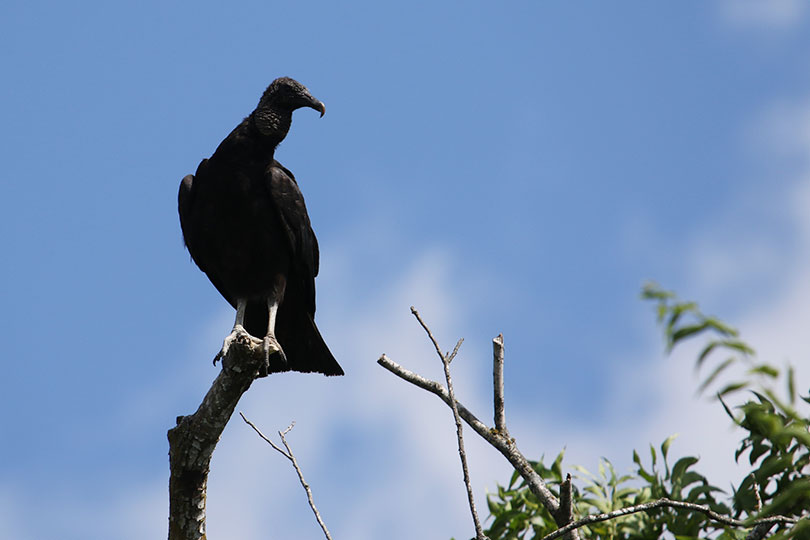By Jennifer Whitlock
Field Editor
More ranchers are finding their livestock, particularly newborn or young animals, falling victim to black vultures. Although the birds are primarily carrion scavengers, they’re also a predatory species that kill kid goats, calves and lambs when the opportunity arises.
“Traditionally, black vultures are only found in South Texas, but in the last decade they’ve expanded, and the population has grown. They’ve always been a problem for ranchers, but with the expansion in range and numbers, it’s become an even bigger problem,” Texas Wildlife Services (TWS) Program State Director Mike Bodenchuk said. “And now we’ve seen changes in Texas livestock production. Where people used to breed wool sheep, they’re raising hair breeds. Hair breeds might be lambing year-round, calves are hitting the ground in unusual seasons or what used to be unusual season, and now we’ve got a bigger problem because there are a lot of vultures in the summer and fall.”
The crafty birds have learned to home in on livestock birthing areas. Although they assist in cleaning up afterbirth and stillborn livestock, they also gather in large numbers to attack females during the birthing process, resulting in lost replacement animals and sometimes lost mothers, as well.
The black vulture is protected under the Migratory Bird Treaty Act, which prevents people from killing vultures or any other migratory bird without a permit.
So, to help Texas ranchers who are losing livestock to black vultures, the U.S. Fish and Wildlife Service (FWS) granted a permit to the Texas Wildlife Damage Management Association (TWDMA) for black vulture management. TWDMA is a member of the cooperative TWS.
Previously, those experiencing issues with the birds could obtain a depredation permit from FWS, but it’s a time-consuming and detailed process. Now, a sub-permit can be quickly issued by TWDMA.
“The traditional permitting process through FWS can be long and problematic. You must apply online, pay online and then there can be a 60- to 90-day wait, which for most people, is too long,” Bodenchuk said. “But the blanket permit issued by FWS to TWDMA allows the association to give sub-permit status to livestock producers. They can contact the Wildlife Services district office, speak with a biologist and the association can issue a permit usually within about 48 hours.”
Depredation permits allow for lethal removal of a few vultures to reinforce nonlethal harassment. Under the sub-permit, ranchers can remove up to five black vultures each. The blanket permit issued by FWS to TWDMA allows for the lethal removal of up to 750 vultures in Texas.
Non-lethal control methods include auditory and visual dispersal methods like lasers, propane cannons and “effigies,” decoy birds hung head-down as though they were dead.
Lethal control serves as a deterrent to remaining members of the bird’s flock, Bodenchuk said.
He also noted TWS recommends ranchers hang the dead vultures in a nearby tree because vultures don’t like to come near a dead vulture.
“So, by shooting one and hanging it as an effigy, a rancher can reinforce hazing and chase another 50 of them off,” he said.
The agency recognizes the permit cap of 750 is limited, but there is a possibility it might be extended if there’s enough need.
Bodenchuk said TWS biologists would be “triaging” cases to make sure those who have the most need can get a permit. Ranchers should call their TWS district office to start the sub-permit application process.
TWS district office contact information:
Canyon: 806.651.2880
College Station: 979.599.5070
Corpus Christi: 361.299.1176
Ft. Stockton: 432.360.1122
Ft. Worth: 817.978.3146
Kerrville: 830.896.6535
San Angelo: 325.655.6101
Uvalde: 830.278.4464
Click here for more information on vulture damage management.


In the last 5 or six years these black vultures have over populated around Pottsboro at and near Lake texoma.
They are a terrible nuisance killing cats , dogs and cows having calves, I even seen them attack a injured bull who had a sprung leg and couldn’t get up, there were hundreds of these black headed buzzards eating the bull alive.
They need to be better controlled.
We seem to have more problems with the Caracara attacking births than the buzzards
I have about 40 in the trash daily of my apartment complex in Houston. Someone needs to control them.